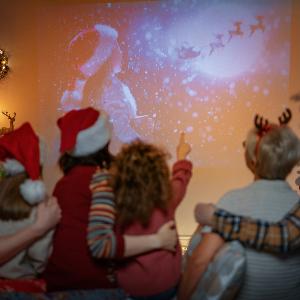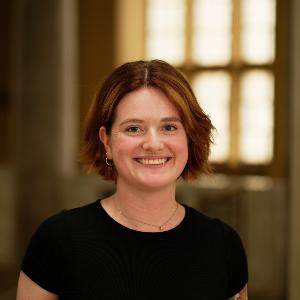The family in films: When Christmas gets out of hand
6 Dec 2024
An interview with religious scholar Luise Merkert on schmaltzy Christmas movies and our fascination with horror.
6 Dec 2024
An interview with religious scholar Luise Merkert on schmaltzy Christmas movies and our fascination with horror.

Religious narratives can be found in many films, especially at Christmas time. | © IMAGO / Depositphotos/konstantin yuganov
At the Faculty of Protestant Theology’s Chair of Religious Studies and Religious History, research into how the family is portrayed in films is conducted under the guidance of Professor Daria Pezzoli-Olgiati. Luise Merkert, a research associate on this project, is especially interested in studying references to religion in horror movies, which even appear during the Christmas period.
Any number of sentimental Christmas films are shown year in, year out. And every year, tears flow as we watch them. Why is that?
Luise Merkert: The run-up to Christmas is generally stressful. The year is drawing to a close and so much has happened. So, we look forward to a quieter, more reflective time. Christmas movies address precisely this longing in us: the desire for intimacy and a sense of security in the family.
It is not unusual for the ads produced by, say, supermarkets to deliver moralizing messages as Christmas approaches: Make time for your children, not the washing-up; visit your lonely father…
That’s absolutely true! Films communicate values and norms that are shared by society. For us, family should have something to do with feeling safe, having a place of refuge. That said, commercials present an idealized picture of the family. In reality, everything is much less harmonious.
At the Faculty of Protestant Theology’s Chair of Religious Studies and Religious History, you study how the family is portrayed in films. Does Christmas still have any religious connotations at all in movies?
Much has changed, including the way Christmas is celebrated in the family. But Christmas definitely remains a religious festival. Films assimilate the references to religion, adapt them and translate them into our modern context.
Horror films are the focus of your personal research …
The question I ask is how families are portrayed in contemporary horror films and what part is played by religious motifs. Religion touches on the transcendent, the uncontrollable. That can conjure up fears. On the other hand, horror films also play out events that we cannot influence or control – which is what scares us. In this context, religion can be both a resource and a threat.
Is it primarily rituals from the Catholic religion that are featured in horror movies?
That depends. Some films do have a strongly Catholic flavor; others pick up on different religious traditions. Horror is a genre that exists the world over and that frequently touches on religious themes.
And what about other genres? Are similar references to religion made in romantic comedies or science fiction films?
Definitely, yes. Marriage and values legitimized by religion are often front and center in romantic films – especially in American productions. And science fiction likewise picks up on religious themes such as resurrection and the search for knowledge.
Family is a universal topic that appears not only in Christmas movies, but across almost all genresLuise Merkert
And what part does the family play in all this?
Family is a universal topic that appears not only in Christmas movies, but across almost all genres: in “Star Wars”, “Interstellar” and “Arrival”, for example. Even horror films often explore the issue of what makes a family a family. Traditional role models are called into question or turned on their head. Innocent children morph into something evil. And that raises interesting questions: What happens when these familiar roles are broken up? What fears come to the surface?
What impact does the way in which religion and the family are portrayed in films have on society?
I think that films pass religion on to some extent. They pick up on religious narratives, adapt them and continue to communicate them. Especially popular films that are seen by millions of people have a tremendous reach when it comes to spreading religious symbols, ideas or stories.
The churches no longer have any influence on the content…
In the early days of film, their influence was very considerable. Back then, showing religious films in churches was welcomed. Church actors also played a part in regulating films – with what is known as the Production Code in the USA, for instance, which had a say in what could and could not be shown in movies. Moral and religious values were channeled into this code and restricted the depiction of homosexuality and violence. Today, the church’s direct influence on films is much weaker, but religion remains an important topic. For example, music videos that deal with religious narratives – such as Lady Gaga’s “Judas” – elicit criticism and outrage in strict religious circles. Religious institutions and Christian influencers actively disseminate their religious values in films that get posted on social media. The influence has shifted, but it is still there.
Films are a fascinating medium via which to investigate how society and religion affect each other.Luise Merkert

searches for religious motifs in horror films in her research. | © N. Klekotko
From a research perspective, what do you find interesting about this topic?
As a religious scholar, I find it exciting to see how religion is changing but continues to remain relevant. Movies and media play a part in discussing, passing on and reinterpreting religious themes. Films are a fascinating medium via which to investigate how society and religion affect each other.
Can you recommend a Christmas movie in which the topics of religion and family play a major role?
If you want to get away from family stresses a little bit, you could watch “The Lodge”, a horror film produced in 2019 by Austrian director duo Veronika Franz and Severin Fiala. In this movie, Christmas gets so out of hand that viewers are more than happy if they only have to argue with relatives about who clears the table after dinner. If you are into kitsch, you could try “Conjuring 2” – a horror film with a surprisingly schmaltzy happy end, including a dance in front of the Christmas tree.
Luise Merkert is research associate and doctoral candidate at the Faculty of Protestant Theology’s Chair of Religious Studies and Religious History. She is writing her dissertation on the subject of “Family and religious symbol systems in the contemporary horror film”. Together with Prof. Daria Pezzoli-Olgiati, she is also active in the Bavarian research network ForFamily.